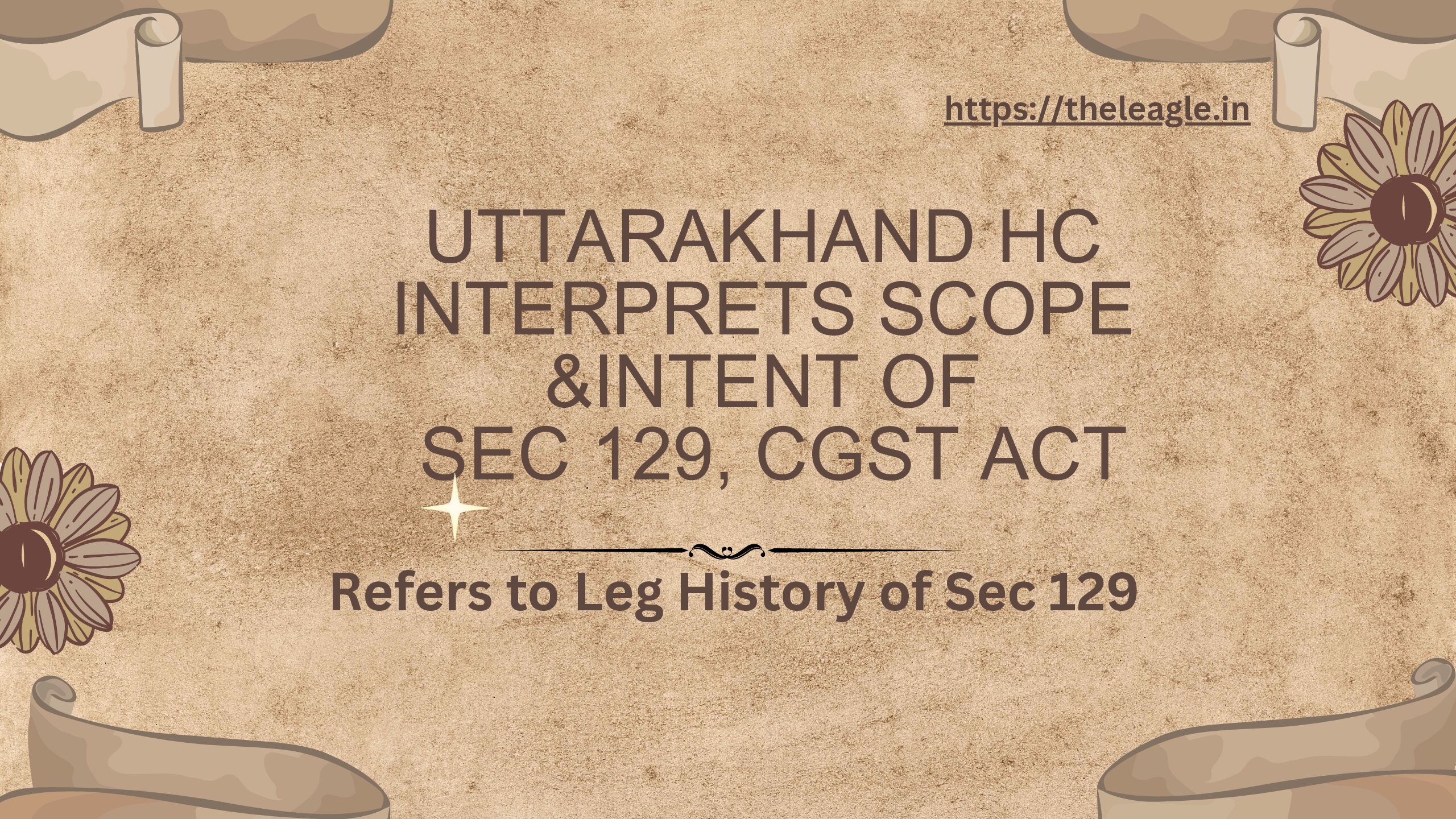In a crucial decision[1], the Uttarakhand High Court observed that every case of search and seizure of vehicles need not necessarily lead to imposition of penalties under Section 129, CGST Act, 2017. The High Court referred to the legislative history of Section 129 and noted that the provision may be invoked only when contravention of provisions may require payment of tax, else penalties should be imposed under Section 122, CGST Act, 2017.
Facts
The petitioner in the impugned case was in the business of manufacturing PC wires and purchased raw materials from Steel Authority of India Limited, Kolkata. The goods were transported from West Bengal to Kanpur through a railway wagon, which was taken into custody by the petitioner for further transport to Bazpur. For the transport to Bazpur two vehicles were used. The entire transport happened against invoices. When the vehicles were intercepted, it was found that the vehicles did not carry the delivery challans as required under Rule 55, CGST Rules, 2017. Orders were passed wherein separate penalties were imposed on both the vehicles under Section 129, CGST Act, 2017. Against the said orders, the petitioners approached the Uttarakhand High Court.
Arguments
The petitioner’s case was that not carrying the delivery challan was only a procedural irregularity or impropriety and there was no element of evasion of tax. The petitioners contended that imposition of penalty under Section 129, CGST Act, 2017 was disproportionate. The petitioners emphasised that the tax had been paid for the goods transported from Bengal to Bazpur, e-way bills were generated, and the Revenue Department had all the relevant information about the transport of goods. In the absence of any intent to evade taxes, the imposition of penalty under Section 129 was challenged as disproportionate.
The Revenue Department, on the other hand, argued that Rule 55 mandated that the vehicles need to be accompanied by a delivery challan and the intent is to prevent leakage of taxes. It was further highlighted that Section 129 begins with a non obstante clause and thus has an overriding effect over all other provisions of CGST Act, 2017 including Section 122 which prescribes penalties for certain offences.
The Uttarakhand High Court framed the dispute as one involving determination of the relevance of Section 122 vis-à-vis Section 129. Both the provisions prescribe that penalties could be leived on the assessee under certain circumstances, the question was which provision is more relevant under certain circumstances including in the impugned case.
Decision
The Uttarakhand High Court referred to the relevant provisions and observed that Rule 55(5) requires that the vehicles should be accompanied by a delivery challan. At the same time, Rule 138-A(1)(a) also mentions that the person in charge of a conveyance can carry an invoice or a bill of supply or a delivery challan, ‘as the case may be’. The High Court noted that an invoice and a delivery challan were clearly interchangeable under the Rule, and further noted that the State counsel had admitted that no additional information would be found in any of the other two documents. While the petitioner clearly violated the requirement of Rule 55(5), the High Court adopted a purposive and harmonious interpretation by noting that Rule 138-A(1)(a) mentions that delivery challan was act a substitute for invoice under certain circumstances.
The Uttarakhand High Court accepted almost all the petitioner’s contentions and observed that it was not the case that delivery challan was not carried along to evade tax since the tax had already been paid. And further observed that the principle of harmonious construction suggests that a statute should be interpreted to give life to each provision. Adopting this principle, the High Court noted that if every non-compliance with respect to documents of a vehicle would lead to imposition of penalty under Section 129, it may render Section 122 redundant.
Accordingly, the Uttarakhand High Court referred to the legislative history of Section 129 – and its amendment in 2022 – to make the following observations:
First, that Section 129 envisages situations where there is an element of tax and thus vehicles may be released by the proper officer on payment of tax.
Second, Section 122 makes a person liable to tax if taxable goods are transported without documents. Mere non-production of documents is punishable under the provision.
Third, Section 130 would come into play if both intention and tax are involved.
Accordingly, the High Court held that in the impugned case, there was only a violation of Rule 55(5), the petitioner had supplied all other information to the Revenue Department. Thus, the authorities should have proceeded to levy a penalty under Section 122 of CGST Act, 2017 instead of Section 129. The High Court also made it clear that not every interception of vehicle in anticipation of contravention of the statutory provisions should lead to imposition of penalty under Section 129. The officers should invoke the relevant provisions as per the facts and circumstances of the case.
ConclusionThe Uttarakhand High Court’s observations are a welcome exposition of the law and the interplay of Sections 122, 129, and 130 of CGST Act, 2017. The High Court’s interpretation of the provisions with an apt use of the principle of harmonious construction introduces much needed clarity as to which provision is relevant under which circumstances. Of course, many fact situations may not be straightforward and the officers will be tempted to invoke Section 129 frequently, but the impugned decision nonetheless provides clarity on the scope of the relevant provisions.
[1] M/s Prestress Steel LLP v Commissioner, Uttarakhand State GST and Others TS-662-HCUTT-2023-GST.
